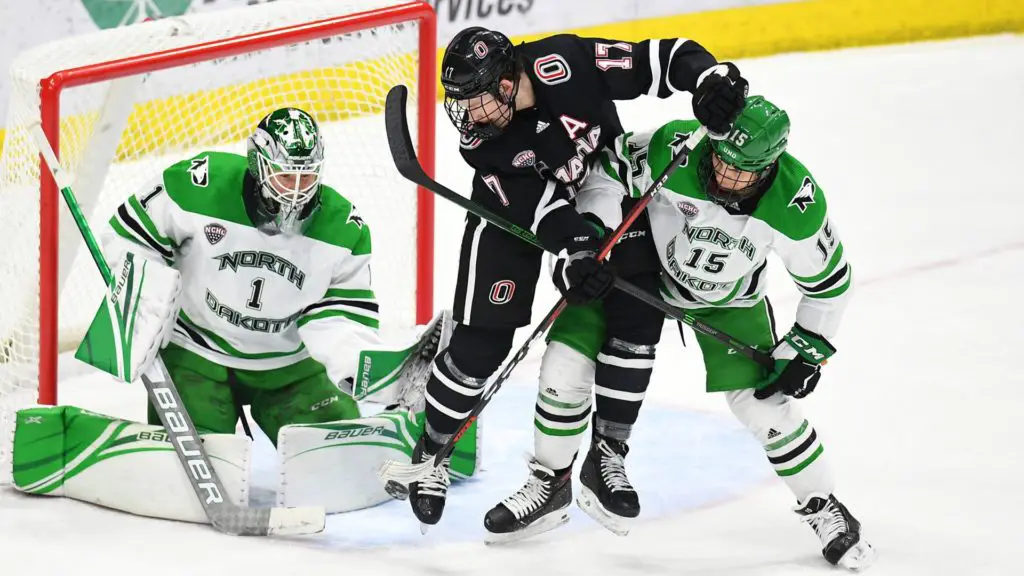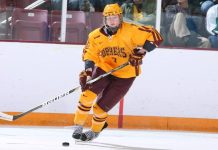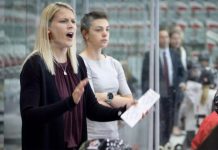
Each week during the season, we look at the big events and big games around Division I men’s college hockey in Tuesday Morning Quarterback.
Paula: Jimmy, there’s so much to talk about this week as several conferences finished their regular-season play. There are several things that come to mind immediately, but I want to begin with two that circle back to things we’ve discussed.
The first is Wisconsin’s one-season turnaround, going from last place in the Big Ten at the end of 2019-20 to this year’s regular-season champions. Last season, the Badgers had all the potential and made great strides without the rewards that normally come to a rebuilding program. This season, Wisconsin bolted toward the end of the season with a seven-game unbeaten streak and took advantage of the opening that Minnesota provided when the Golden Gophers lost to Michigan Friday night. It’s a remarkable 180.
I am reminded that just a couple of months ago, someone really smart (hint: it’s you) suggested that the Badgers were the team to challenge Minnesota when it looked like the Gophers were running away with things.
The other item I want to circle back to is the perhaps predictable news that the remainder of the seasons for Holy Cross and Merrimack is cancelled because of positive COVID-19 tests among Tier 1 individuals. It wasn’t these teams, specifically, that we discussed; we just feared that someone’s season would end in just this way. It doesn’t matter where Holy Cross was in the Atlantic Hockey standings or where Merrimack was in Hockey East, either. It’s just sad.
I don’t think that you and I are especially prescient – well, clearly, I’m not – but does it seem as though this season has given us a clearer blueprint for March than we may have realized while we were caught up in the midst of it?
Jim: Sometimes, Paula, it’s nice to be right, like in the case of Wisconsin. This seemed like a team that simply needed to field their full lineup – one that wasn’t hampered by World Juniors – to come together as the dominant team many people know they were capable of being.
Some, though, being right is awful. Both Holy Cross and Merrimack certainly had long paths to win their postseason tournaments, but that’s not a good reason that the student-athletes end up missing the postseason, for some for the second straight year.
My fear is that this isn’t over.
I’ve spoken with commissioners who already have in place protocols to handle teams not being able to play. In all cases, you won’t see games moved. Teams will be forced to either forfeit or have the game declared as no-contest allowing their opponent to advance. Hopefully this doesn’t happen and that teams are able to field 15 skaters and two goaltenders each playoff game. Certainly, a team could be shorthanded at times, but I’m hopeful games will be played.
On a different note, and I’ll start by recognizing this is a Division I men’s column. I don’t know a ton about the women’s national championship but have seen enough on social media to see that people aren’t happy with the selection. Namely, leaving Minnesota out of the field and placing Minnesota Duluth, Boston College and Providence ahead. From what I can tell is that most around the game – media, particularly, as that’s who I follow on social media – felt Minnesota got jobbed.
I’m not forming an opinion on that as I’m not informed enough to do so. But it makes me wonder are we going to see the same types of conflicts in 12 or so days when the NCAA Division I men’s committee meets to seed that tournament. Though I keep saying I have faith in the committee, do you think I should be nervous that most will feel there is something unfair about the men’s seedings?
Paula: Jimmy, I was hoping you’d bring up the women’s field. I’m not knowledgeable enough to comment on the specifics of those selections, either, but people who are have sounded a bit of an alarm. That is really the third thing I wanted to circle back to this week, the upcoming men’s selection following the conference playoffs.
As I’ve said, I do not envy the committee at all and I’m embracing your faith in the people from the hockey community who are directly involved. That said, even when it’s simple math, a transparent formula and an entire season with interconference play to back it up, there is still grousing about the 16-team field.
So, of course, yes. There will be a perception of bias and people will complain about unfairness. The extent to which that happens depends as much as what transpires off the ice as what happens on, I think, between now and March 21.
As you’ve said, should more Tier 1 personnel from teams playing test positive during the coming weeks – and that is a fear that I share with you – games won’t be moved or rescheduled. Seasons will end abruptly. Teams will forfeit, and the advancing teams may also be affected by perceptions about how they advanced. Granted, this is speculation, but we know how bias affects perception of a given conference’s strength in relation to another conference. We know that this happens within conferences, too.
An overall scenario that I’m eyeing is Atlantic Hockey.
The Black Knights are 14th in the PairWise, for what that’s worth right now. AIC looks to be in. Say that AIC loses and another team beats Army for the playoff championship and the math works out that Army is still in. Does that mean Atlantic Hockey will get three teams in, or will the committee overlook Army – a team that has worked its way into field consideration for the whole season – so that a team from a “stronger” conference is included?
What about another bubble team, Clarkson, that hasn’t played since February 4? The Golden Knights are cleared to play but their series to end the regular season against St. Lawrence has cancelled because of COVID-19 issues with the Saints. What if the Golden Knights are the team knocked out in favor of a third Atlantic Hockey team or even a fourth WCHA team?
Maybe these things seem farfetched, but there are scenarios out there that will anger many people. I do trust the committee to do the best job it can with the information it has available to it at the time – and that includes its collective subjectivity based on seasons past.
I’m going to turn your question around on you: To what extent do you think the selection will be haunted by the decisions of the committee?
Jim: I think “haunted” is a very strong word. I’m not too concern that the committee will work as such that the tournament is tainted in any way.
That said, I think it would be helpful to have some transparency in the process. Mike Kemp was excellent a few weeks ago when he was a guest on USCHO Spotlight. He tried to lay out how the PairWise will be used – if at all – but even he had to walk back some comments that made it seem like the PairWise will be a major influence.
It was clarified after that the PairWise will be used to help break ties and rank teams within conferences, but it would be helpful if the committee would give fans some sort of a sample blueprint on how selection Sunday will go.
That may be easier said than done.
The reason? At this point, I’m not convinced that the committee entirely knows how selection Sunday will go. We’re going to have to let scenarios play out, then somehow rank the leagues and the teams within and make selections. Then comes ranking the teams to try to make regional first-round matchups fair. There easily could be a difficult balance between trying to maintain integrity to how the committee wants the field and, possibly, as desire to limit travel for the 16 teams during a pandemic.
For example, if all of the seed in on band (the term the NCAA uses to discuss the four number one seed, four number two seeds, etc.) are from one region, do you move teams band-to-band or do you put two teams on airplanes when there might be a much closer alternative.
Somehow, these are the questions about the tournament that keep me up at night.
Paula: Maybe “haunted” is the wrong word, as it implies that the committee itself will be visited in perpetuity for its decisions. Hounded, though, may apply – especially when it comes to the seeding scenarios you suggest.
I’m not suggesting that the PWR should be the model, either, for the current top 16 teams this season. I do think, though, that the committee will need to be very transparent in its rationale to address the criticism that is inevitably coming its way.
I admit that I hadn’t even considered travel as a consideration for seeding, although one of the things that keeps me up at night is travel to four different locations for the regional tournaments. That decision is a done deal, I know, and it still baffles me.
While I don’t doubt each program’s commitment to the safety of everyone involved, I don’t doubt for a second that each team within a given band – especially the top band – wouldn’t advocate for ignoring travel concerns for a favorable (and perhaps fairer) placement. That’s not a knock. Each team wants its best shot in the tournament.
Jim: My hope is that the NCAA will do its best to keep the student-athletes who must travel by plane away from the public. That means charter flights, which is certainly expensive. I am not one to control anyone’s purse strings but that’s a expense that seems to have value for the NCAA and everyone involved.
I will close with one thought, though. In what has been a challenging season that has required flexibility and tolerance and just about everyone’s part, something feels normal about reaching conference tournaments. It was nearly one year to the day that the plug was pulled on every conference and NCAA postseason game.
So to see these games get played – fingers crossed without incident – makes me feel better inside.


